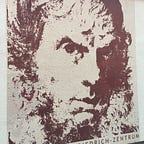[哲學資料]Willkür的問題
先前寫一篇康德論文,有人問我為何會將術語「Willkür」解釋成「faculty of choice」或「capacity of choice」。康德使用這個術語時,會與另一個術語「Wille」作對比。其實英文翻譯幾乎是學界研究共識,也沒有甚麼爭議。我引用的是劍橋大學康德英文翻譯本。不過,既然有人問得出,只好試試盡力回答。
我哲學不好,無法從義理角度來回答,只好找找文本證據。根據最新出版的《The Cambridge Kant Lexicon》,「Wille」與「Willkür」的定義是:
“Wille is for Kant the legislative faculty of volition, or practical reason, which is the cognitive capacity that allows rational agents to formulate laws of action on which Willkür can choose to act, whereas Willkür is an executive faculty of volition, of choice, or active desire, allowing beings — of either a rational or nonrational sort — to choose from among available options as they register these options.” (p.508)
對康德道德哲學有基本認識,相信不難明白當中的意思。文本的證據可以看康德1797年出版《道德形上學》(Metaphysik der Sitten) 的定義:
“Laws proceed from the will (Wille), maxims from choice (Willkür). In man the latter is a free choice; the will, which is directed to nothing beyond the law itself, cannot be called either free or unfree, since it is not directed to actions but immediately to giving laws for the maxims of actions (and is, therefore, practical reason itself). Hence the will directs with absolute necessity and is itself subject to no necessitation. Only choice can therefore be called free.” (AA 06:226)
不過,就算是英文的康德研究,為了避免誤解,有時都會直接保留Wille同Willkür,因為清楚直接很多。
